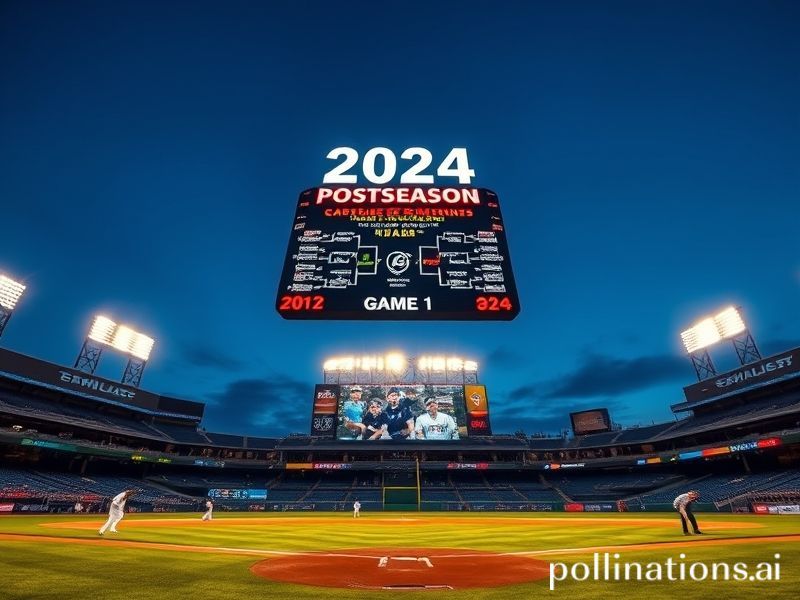October’s Global Glitch: How America’s Baseball Playoff Calendar Hijacks Planet Earth (and Your Sleep)
From the Ashes of Summer, America Sends October Missives to a Distracted Planet
Byline: Our Man in the Cheap Seats, Somewhere Over the Atlantic
While COP negotiators in Baku trade carbon credits like Pokémon cards and the Indian Ocean swells with yet another “once-in-a-century” cyclone, the United States has decided the most pressing global calendar update involves 26 men in pajamas trying to hit a cowhide sphere past a miniature garden fence. Yes, the MLB postseason schedule has dropped, and—to the astonishment of everyone outside the 50 states plus Ontario’s Rogers Centre diaspora—its ripples lap even here, in the part of the map still referred to by American broadcasters as “the ROW” (Rest of World).
For the uninitiated: October baseball is essentially a month-long televised anxiety attack where billionaire franchises play sudden-death rounds until only one fan base remains capable of feeling joy. This year the pageant begins on October 1 with the best-of-three Wild Card series—MLB’s polite euphemism for “may the odds be ever in your favor”—and could stretch, if your deity is particularly cruel, to Game 7 of the World Series on November 2. Somewhere in that span, 12 teams will collapse into one, and the price of cable in Seoul will rise another won because Disney needs to recoup broadcast rights.
The international significance? Subtle, but real. Start with geopolitics: the Houston Astros—named, with no apparent irony, after the city’s historic role in the Space Race—will almost certainly feature. Their presence guarantees a minimum of six prime-time slots on ESPN’s global feed, nudging aside re-runs of Premier League highlights that otherwise keep ex-pat Liverpool fans from rioting in Singapore sports bars. Meanwhile, Shohei Ohtani’s Dodgers are the league’s designated tourism ad for Japan; every homerun he hits translates to roughly ¥2.3 billion in merchandising and at least one lecture from my Tokyo editor about “soft-power projection.”
Then there is the matter of time zones. First-pitch in Arlington, Texas (GMT-5) will occur during Tokyo’s morning commute, guaranteeing bleary-eyed accountants on the Yamanote Line watching on mute with subtitles. In Lagos, the games start just after midnight, which sounds inconvenient until you remember Nigeria hasn’t had reliable electricity since the last military coup. Viewers there resort to Twitter GIFs and interpretive radio broadcasts—proof that human ingenuity blooms wherever capitalism plants a blackout.
Europe, ever the snotty older cousin, pretends disdain. Yet London’s betting shops still post odds on whether Aaron Judge will fracture another rib, and Berlin’s startup bros have gamified the postseason into NFTs called “OctoBalls” that promise, in their whitepaper, to “democratize fandom.” (Current trading volume: 43 euros and a half-eaten pretzel.) The continent’s real engagement happens in the Netherlands, whose entire Caribbean territory has been commandeered by MLB scouts for winter ball. On Curaçao, kids skip school to watch the Braves-Dodgers NLCS because, as one 14-year-old told me while fielding grounders barefoot, “At least here the only thing stolen is second base.”
Back in the States, the schedule’s biggest innovation is the “travel day” strategically inserted so Fox can air its Tuesday night medical dramas. This humanitarian pause allows players to hydrate and fans to refinance their mortgages after purchasing standing-room-only tickets. Internationally, the gap is filled by highlight packages set to K-pop and reggaeton—cross-cultural pollination that would be touching if it weren’t also an algorithmic ploy to harvest Gen-Z eyeballs.
And so, as the Arctic melts a little faster and central banks debate digital currencies no one asked for, the planet divides itself into two tribes: those who believe the fate of the universe hinges on whether a man from the Dominican Republic can hit a slider in the ninth, and everyone else, busy surviving. The latter group may scoff, but remember: empires have fallen while games endured. The Romans had gladiators; we have relief pitchers. Bread and circuses, updated for 4K.
When the last out is recorded—somewhere between Halloween candy markdowns and the first Christmas ad—one city will burn couches in jubilation while another files for collective therapy. The rest of us will check our phones, realize we’ve missed three actual news cycles, and quietly recalibrate our disaster alerts. Until next October, anyway.







